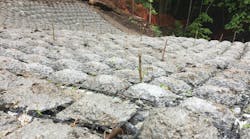Idaho couple pays $75,000 Clean Water Act penalty for streambank destruction
The U.S. Environmental Protection Agency (EPA) announced that Candace Stuart-Stephens and Jerrod Stuart have paid a $75,000 Clean Water Act penalty for the unauthorized destruction of the native streambank adjacent to their property on the Priest River in Priest River, Idaho.
The case brought against the couple
The EPA brought the case against Stuart-Stephens and Stuart after the agency discovered that on or around June 4, 2022, as they prepared to install two bridges and one dock, the couple excavated and side-cast natural riverbank habitat of the Priest River and replaced it with rip rap rock, decorative rock and steel pilings without obtaining a Clean Water Act permit from the U.S. Army Corps of Engineers.
Environmental implications
An EPA press release states that this type of habitat destruction has serious implications for impacts to cold water aquatic life, including spawning of trout and char.
This section of the Priest River is listed by the Idaho Department of Environmental Quality as impaired by high temperatures and sediments deposits – due, in part, to severe erosion along its banks – and is deemed critical habitat for bull trout under the Endangered Species Act.
The Priest River also hosts westslope cutthroat trout, which is considered a Species of Special Concern by the State of Idaho, and a sensitive species by the U.S. Forest Service.
“Property owners must obtain the necessary Clean Water Act permits to ensure that any work impacting waters of the United States is done in a manner that prioritizes ecosystem health and minimizes water quality impacts that can affect people’s drinking water, recreational opportunities, and endangered, threatened, or sensitive species,” said Director of EPA Region 10’s Enforcement and Compliance Assurance Division Ed Kowalski in a press release. “As this case demonstrates, EPA and the Army Corps of Engineers take very seriously our responsibility to enforce the Clean Water Act to maintain the integrity of the waters entrusted to all the citizens of the United States.”
Under terms of the settlement, Stuart-Stephens and Stuart also agreed to remove some of the materials they have placed in the river, apply for a permit from the U.S. Army Corps of Engineers, and pay additional funds to a nearby wetlands mitigation bank as compensation for the loss of riverine habitat.




